Coordinated inauthentic behaviour surfaces again in the re-run of Romanian elections
Coordinated inauthentic behaviour surfaces again in the re-run of Romanian elections09/05/2025
Annulled last year due to foreign interference, the re-run of Romania's presidential elections continues to be overshadowed by concerns over opaque affiliations, cyberattacks, and coordinated online campaigns.
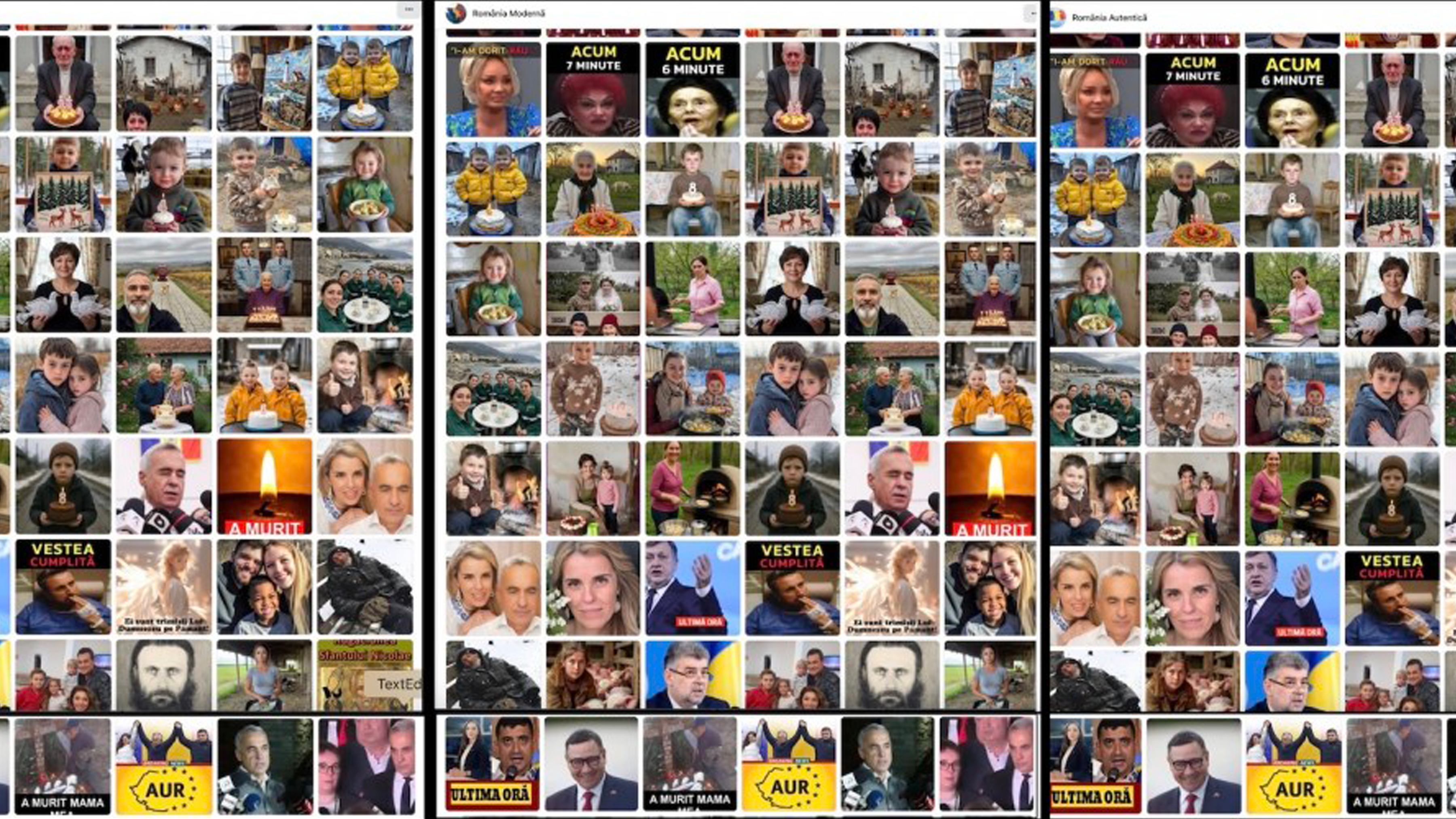
By Manuela Preoteasa, ADB and University of Bucharest. The article was peer-reviewed by Raluca Radu, University of Bucharest. Data analysis conducted by Fabio Giglietto and Massimo Terenzi, University of Urbino.
We analysed a dataset of 45,272 posts from 17 -24 April 2025, created by a list of 1454 Facebook accounts between 17 and 24 of April 2025. The analysis was performed using large language models (LLMs), based on lists of actors compiled by the AI de noi, a community of hundreds of volunteers, which monitors accounts and posts that violate Facebook's policies, including fake accounts, AI-generated images, and emotionally manipulative content.
The PROMPT data analysis found that the majority of posts were not intended to convey factual information but instead relied on emotionally charged, clickbait-style content. Many posts featured AI-generated images, further contributing to their synthetic appearance. The content of these posts did not reflect the current news agenda. Instead, they centered on emotionally salient but politically tangential topics such as tragic personal stories (involving children or the elderly), celebrity news, dramatic weather warnings, public health fears, and nationalist nostalgia, including references to Romania’s communist past or wartime history.
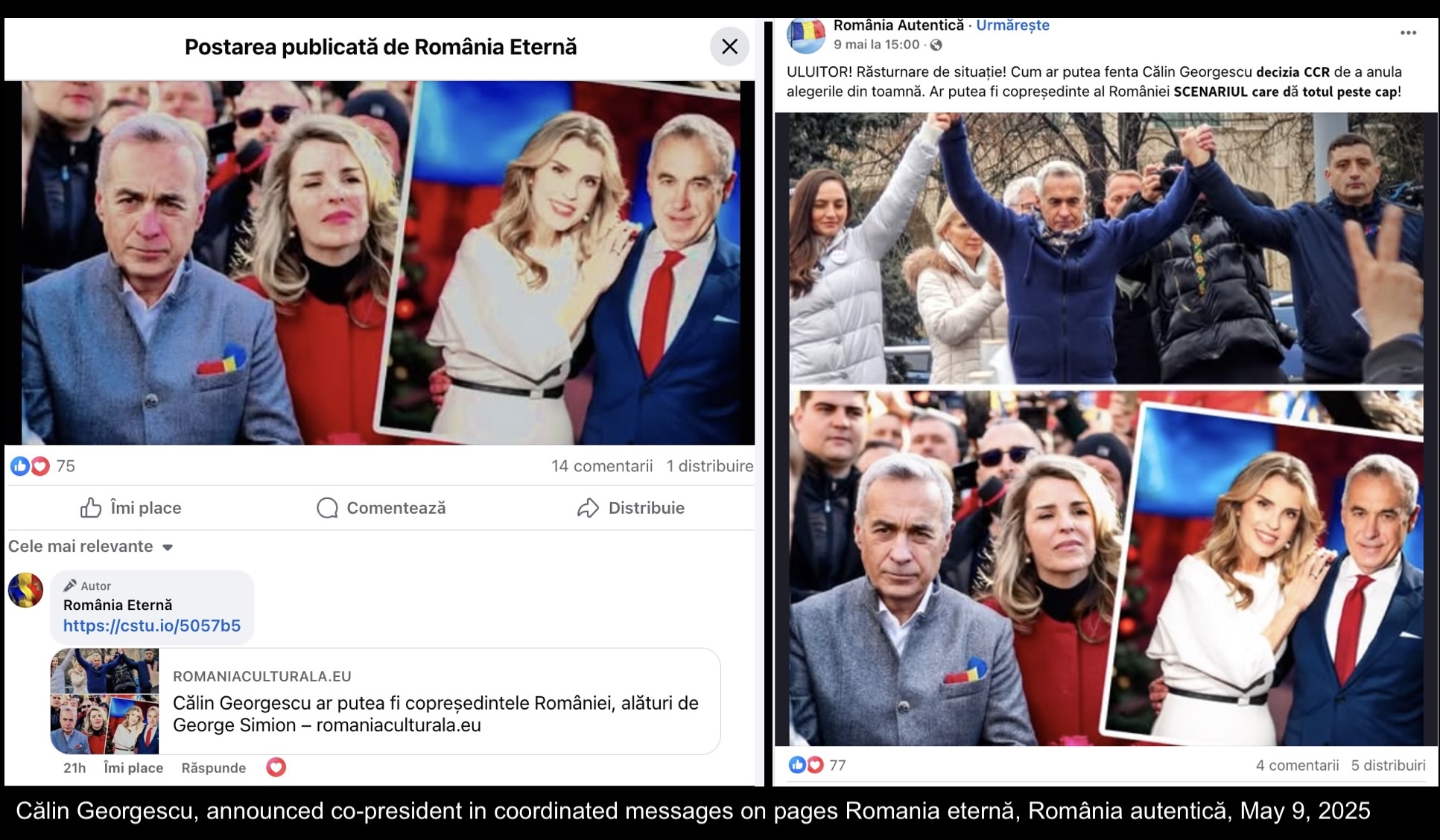
While seemingly apolitical, the messaging often included implicit political cues, either supporting or attacking specific parties or candidates, as we will show below. Other datasets, including some procured by Martinescu et al.(2024) is under further scrutiny within PROMPT research.
Coordinated inauthentic behavior is defined by Meta as "coordinated campaigns that seek to manipulate public debate across our apps” (Meta, n.d.). A common form of CIB is astroturfing, which involves the artificial simulation of grassroots support. As Chan (2022) explains, astroturfing creates "the illusion of widespread support for a product, policy, or concept, when in reality only limited support exists”.
These efforts are typically orchestrated by actors with vested interests, including corporations, political organizations, or foreign governments. Chan (2022) characterizes this phenomenon as "a problem beyond disinformation,” noting its increasingly serious implications for global democratic processes. The Romanian case illustrates how digitally mediated strategies - relying on algorithmic targeting, emotional manipulation, and coordinated distribution - can distort political discourse and compromise electoral integrity.
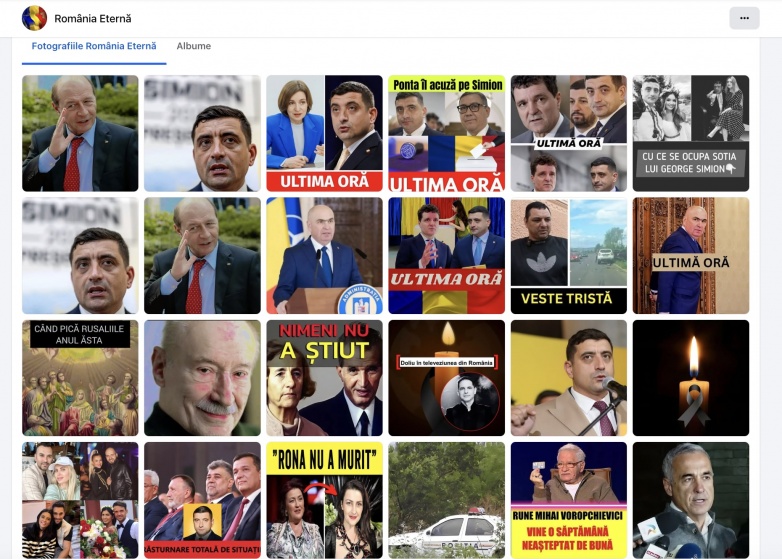
Evidence of Coordinated Inauthentic Behavior in Romanian Facebook Networks (2025 Elections)
In the context of Romania’s 2025 presidential elections, a network analysis of 1,489 Facebook posts, researched by PROMPT revealed patterns indicative of coordinated inauthentic behavior (CIB). These posts were disseminated by 21 distinct Facebook accounts, several of which exhibited strong evidence of connected vertices - a term in network analysis that refers to nodes (accounts) linked through synchronized activity or content similarity. For example, three accounts - România Eternă, România Modernă, and România Autentică - published an average of 149 posts circulated in the analyzed months within a 9.3-second window, an anomaly that points to either automated behavior or centralized control (a defining characteristic of this behavior was the near-simultaneous posting of identical or highly similar content).
The images of children, adults or elderly people, alone in a courtyard from rural areas, with a birthday cake, saying that they are alone and sad, come to amplify the theme of fragmented families.
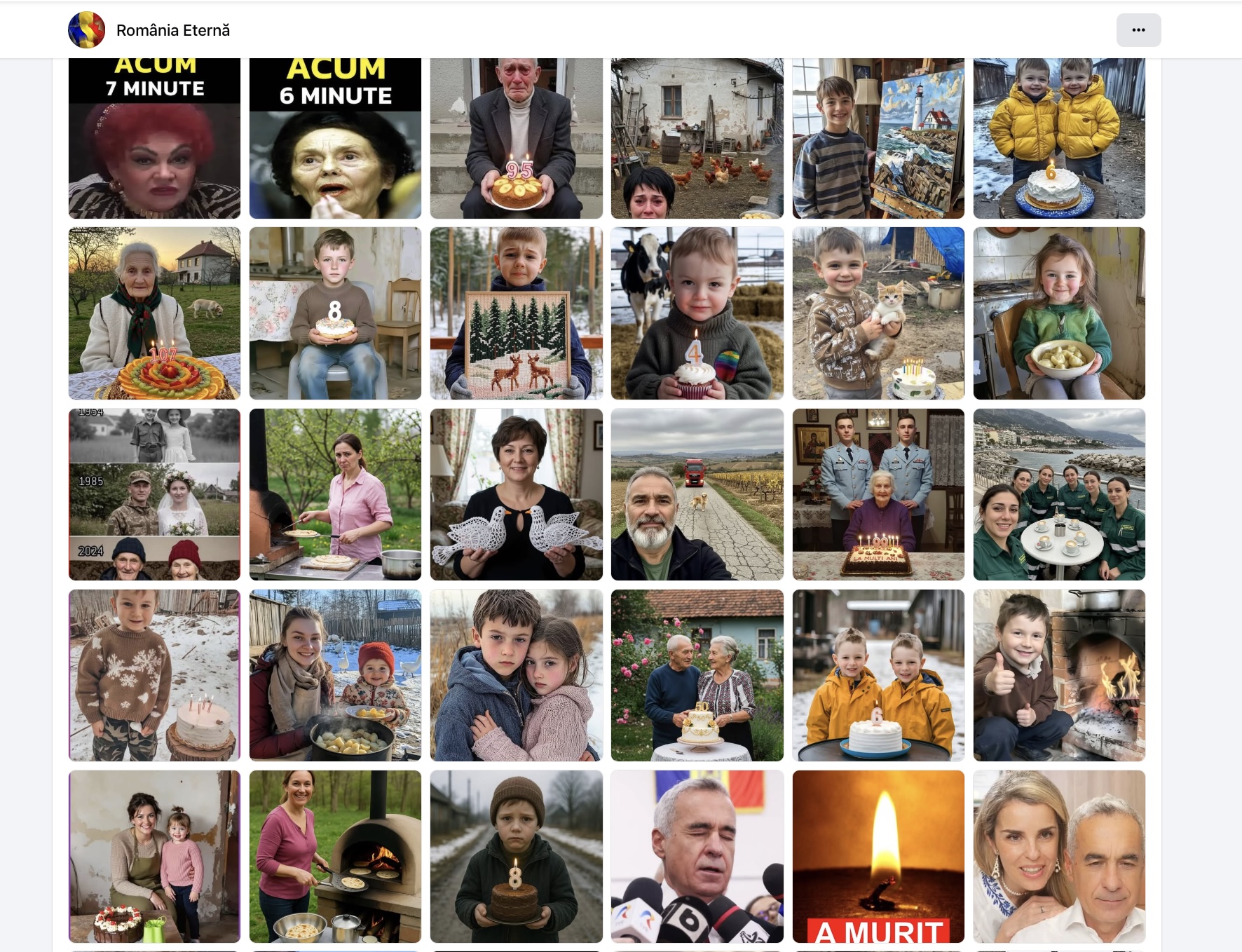
DiResta and Goldstein (2024) identified several methods by which "spammers and scammers leverage AI-generated images" on Facebook to grow their audiences. A common technique involves posting unlabelled AI-generated images accompanied by captions such as "This is my first cake! I would be glad for your marks" or "Made it with my own hands," which explicitly solicit comments and engagement. The aim is twofold: to increase audience size and to inject false information into political discourse.
Romania has the largest community of Diaspora people in Europe, 5.7 million, according to official statistics (Pop, 2025). Some other posts follow the news of the day, in a clickbait style and mainly linking to the website romaniaculturala.eu, with shocking images of accidents, fires, storms, deaths and links in comments where, if clicked, anti-virus softwares warn of phishing. In intense political times, the pages are flooded with political topics (mostly linked to the website romaniaculturala.eu), praising George Simion, Donald Trump or posting the prediction of a horoscope lady saying who will win the presidency. As to give an idea about the metrics, România Eternă has 116K likes and exactly 116K followers, România Autentic has 133K likes and 132K followers, while România Modernă has 115K followers and 0 accounts following, and no lIkes indicated.
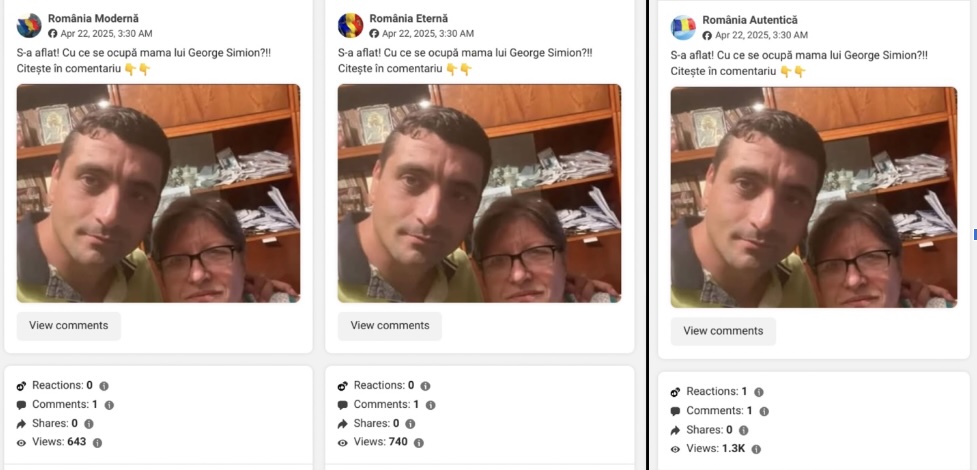
Qualitative Content Analysis
Content-wise, the accounts displayed similar aesthetic and narrative strategies. Posts often featured emotionally evocative scenes: children, elderly individuals, and isolated citizens celebrating birthdays alone - imagery designed to appeal across age demographics.However, in the days surrounding the election (May 4th), content shifted abruptly from general cultural or emotional posts to overt political messaging. New themes included: praise for international figures such as Donald Trump and Elon Musk, amplification of the U.S. Visa Waiver exclusion of Romania, the announcement made public just before election day, Pro-Georgescu narratives and anti-EU themes.
This abrupt thematic shift, paired with coordinated timing, further supports the hypothesis of strategic manipulation designed to influence voter behavior in the final stages of the campaign.The analyzed posts show "a clear right-wing populist and nationalist bias, especially in their treatment of political actors”, according to the analysis coordinated by the University of Urbino, in the framework of PROMPT project. Key characteristics include messages against the parties of the ruling coalition, the social democrats and the liberals, and messages against the Romanian president, Klaus Iohannis (Dec. 2014 - Febr. 2025).
Nevertheless, other posts on these pages showed strong support for AUR (Alliance of Union of Romania) and its leader George Simion, euroscepticism, and a broader populist anti-elite discourse.Although many of the analyzed posts appeared unrelated to politics at first glance, they frequently contained implicit or explicit political messaging, either criticizing certain parties or endorsing others. For instance, some posts targeted the ruling Social Democratic Party (PSD) with statements such as: "PSD is doing what it does best again: it makes promises and then mocks the people” and "The thieves from PSD have destroyed Romania. Stop voting for the red mafia!”
These examples reflect a strong anti-PSD sentiment, consistent with right-wing nationalist and pro-AUR positions. Some posts offered direct support for the far-right Alliance for the Union of Romanians (AUR) and its leader, George Simion: "AUR is the only voice telling the truth! The rest of the parties are in someone’s pocket!” and "George Simion fears no one! AUR fights for the Romanians!”Criticism was also directed at then-president Klaus Iohannis, whose affiliation with the National Liberal Party (PNL) made him a frequent target of anti-establishment populist rhetoric, transcending strict left-right divisions.
When these politically charged messages were combined with emotionally resonant but non-political content - such as personal tragedies, public health scares, or nationalist nostalgia - the overall discursive environment suggested a media ecosystem highly conducive to the spread of populist and extremist narratives, particularly from the far right.Coordinated inauthentic behaviorCoordinated inauthentic behavior (CIB) and astroturfing were cited in the decision of the Constitutional Court among the main reasons for the annulment of the November 2024 election and are surfacing again in 2025 Romania has 9 million TikTok and 13.03 million Facebook users.
In April 2025, TikTok deactivated two secret networks aimed to influence political narratives in the 2025 Romanian elections. One was composed of 27 inauthentic accounts with over 9,000 followers, which used pseudonyms and generic avatars to pose as news outlets, aiming to amplify specific narratives and influence electoral discussions (Ardelean, 2025). The second network consisted of 4,453 inauthentic accounts, primarily promoting the Alliance for the Union of Romanians (AUR) party and, to a lesser extent, independent candidate Călin Georgescu. Operating from Turkey, this network employed fictitious personas to post comments related to the Romanian elections, rather than creating original videos. Each account had approximately three followers on average. TikTok's investigation suggested that a third-party fake engagement vendor was paid to post these comments, although the identity and location of the individuals directing this activity remain unknown. (Ardelean, 2025).
Post-election inquiries were launched both by Romanian authorities and at the European level. TikTok identified around 27,000 accounts operated from Turkey (TikTok, January 7, 2025), each with two or three clips, supporting the Union of Romania (AUR) and Călin Georgescu as of December 17."Remember those bots that generated tens of thousands of comments per second, whose role was to push posts?” rhetorically asked Cristian Terheș, a presidential candidate himself and a member of the European Parliament elected on the AUR list (formerly PSD, currently ex-AUR). He publicly accused Romanian authorities of failing to recognize that the manipulative techniques were directed not only at Călin Georgescu but also at AUR, without any legal measures being taken (Terheș, 2025).
The isolationist candidate scored 40.96%
Romanian presidential elections were annulled in 2024 on claims of foreign meddling. Strong evidence of online coordination actions with content originating from Russia were revealed by a report of the British think-tank Foreign Policy Centre (FPC), which used Osavul, an AI-powered information threat detection software, to analyse over 3,500 messages which circulated in the nullified elections period, across platforms like Telegram, Facebook, X (formerly Twitter), and YouTube (Martinescu et al., 2024).
The report found that most content originated from Russia or affiliated actors, including state-owned media such as RT and Sputnik. Additionally, Iran's Press TV, despite being registered in the United States, contributed by posting or reposting 15 messages about Georgescu between November 25 and December 4, aligning with narratives propagated by Russian-linked entities, the report revealed (Martinescu et al., ibid.). In the re-run elections, new evidence brought by PROMPT project suggest that the coordinated behaviour continued in the online environment, contributing to an unprecedented extremist wave.
Political context, opaque affiliations
Isolationist, far right politician George Simion emerged as the frontrunner in the first round of Romania’s rerun presidential election, held on May 4, 2025, following the unexpected annulment of the previous vote due to foreign interference.Simion secured 40.96% of the vote in the first round of the Romanian elections, and will face independent centrist Nicușor Dan, the mayor of Bucharest, who received 20%, in a run-off scheduled for May 18. This vote followed the annulment of the November 2024 election, which was invalidated due to alleged foreign interference, with a modus operandi described by the state authorities as including "cyberattacks and coordinated disinformation campaigns” (CSAT SRI II, 2024), p. 2).
Simion, leader of the Alliance for the Union of Romanians (AUR), is banned from entering Ukraine on official reasons of "systematic anti-Ukrainian activities” (Mihai, 2024) and the Republic of Moldova for attempts of "destabilising the state”, as explained by the Moldovan prime-minister Recean (Buruiană, 2025).
Simion has contested the Moldovan ban, and a court verdict is expected in mid-May. George Simion was also one of the candidates during the November 2024 elections, when he got about 1.280.000 votes, as compared to this round, when he had a plus of about 2.580.000 votes. The difference comes from the electors of Călin Georgescu, who won a little above 2.120.000 votes in November 2024. Georgescu is the far right politician that won the lion share last year, but was officially banned from running in 2025.
Simion has repeatedly expressed loyalty to Georgescu, a pro-Russian figure, with an anti-NATO and an anti-EU discourse. To secure the support of Georgescu’s voters, Simion has pledged to nominate Georgescu as prime minister if elected (Pândaru, 2025).
While Georgescu appeared rarely in the mainstream media, before November 2024, Simion had a long history of controversies covered by Romanian and foreign newsrooms, as a party leader. In fact, Simion was a constant subject in the media, as his far right party entered the Parliament in 2020 and in 2024 became the second largest political group, after the Social Democrats. Some of these controversies are linked to Russia. For example, Simion was accused of ties with Russian intelligence, by a former Moldovan official. Anatol Șalaru, former Minister of Defence of the Republic of Moldova, publicly stated that Moldova's Intelligence and Security Service (SIS) "had informed authorities that Simion held meetings in Chernivtsi with Moscow agents” (Ziarul de Gardă, 2025).
Simion denied these allegations and filed a defamation lawsuit against Șalaru, which the far right leader lost in the first court ruling (News.ro, 2025). For Georgescu, there are no public evidences of direct ties to representatives of Russia or of any other foreign state yet. A key factor behind the collapse of the 2024 elections was the interference of state and nonstate actors, performing an array of digital attacks, including the widespread use of coordinated inauthentic behavior on social media, as revealed in declassified documents presented to the Supreme Council of National Defense - CSAT (Presidential Administration, 2024). [All thefive declassified reports can be accessed in Romanian here]
"Romania is a target for hybrid aggressive actions, including cyber attacks, hacks, leaks, sabotages”, one of these documents announced (CSAT - SIE, 2024). The metric analysis revealed an abrupt rise between 13 and 26 November 2024, that pushed Călin Georgescu on 9th place globally in video trends associated with certain hashtags; artificially amplification was noticed on TikTok Tok after 24 November 2024, with an explosion of hundreds of million views after the first round of elections (CSAT - MAI, 2025).In 2025, on the rerun election day, Romanian government websites and an online platform affiliated with a pro-Western candidate were targeted by Russian hackers.
This reminds of the previous interference in Romanian elections from state actors, described by the Romanian services report SRI-CSAT (2024). Over 85,000 cyber-attacks were launchedfrom 33 countries "aimed at exploiting existing vulnerabilities in the IT systems supporting the electoral process, in order to gain access to data in the IT systems, alter their integrity, change the content presented to the general public and make the infrastructure unavailable.” (CSAT SRI, 2024).
In both occasions, the Romanian cyber infrastructure resisted the attacks. In the same context, SRI's analysed the electoral campaign of the candidate Călin Georgescu: "The activity of the accounts [in the case of the candidate Calin Georgescu] would have been coordinated by a state actor, who would have used an alternative communication channel to spread messages on the platform”. "The activity was coordinated from various geo-locations" and operated not through bot farms, but "more discreetly from outside to avoid violating platform usage policies". TikTok considers that, in practice, they are coordinated volunteers (a mass guerrilla political campaign or brute force attack in cybersecurity). The dissemination of messages on the TikTok platform was done in swarming.”
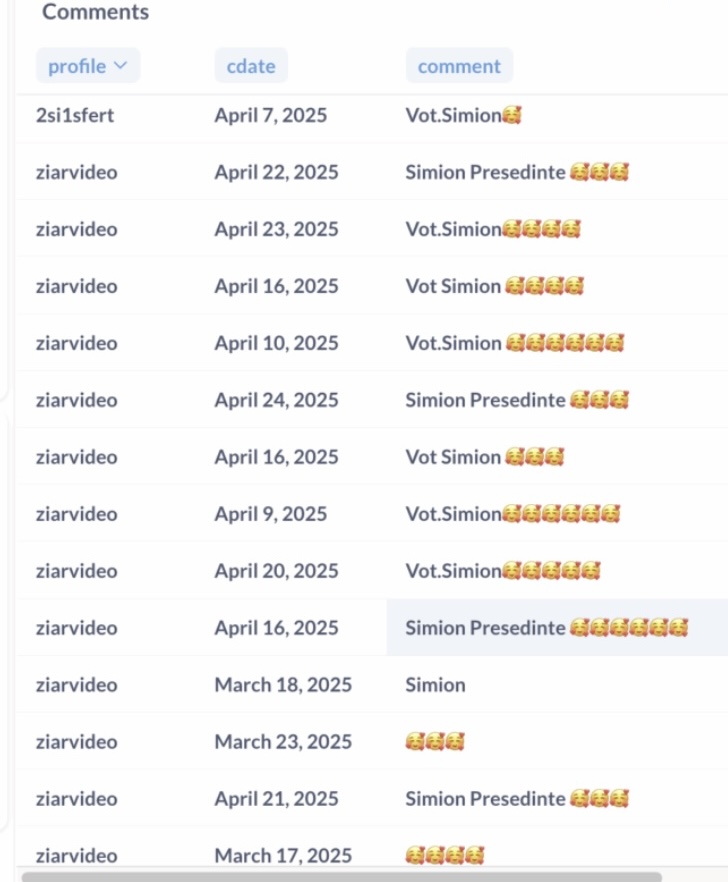
The use of emojis in algorithmic manipulation
A particularly compelling case of algorithmic manipulation came to light just two days before Romania’s presidential election on 4 May 2025, as a result of a joint investigation by investigative journalists from Context and its team of computer specialists.
Their investigation provided empirical evidence that manipulation of TikTok’s content-ranking algorithms in the electoral context extended well beyond commonly cited techniques such as mass publication of videos, comment flooding, and strategic use of hashtags or keywords. Notably, the investigation revealed that emojis were used systematically as part of a broader strategy to game platform engagement metrics and artificially boost the visibility of content supporting specific candidates.Using a custom-built software tool, the research team analysed a dataset comprising over 519 TikTok accounts, more than 70,000 individual posts, thousands of short-form videos, and in excess of 4 million user comments, all of which were generated in the context of Romania’s 2025 presidential race. The findings pointed to highly structured posting behaviours, with patterns that suggested automated or semi-automated coordination.

Beyond the emoji-based manipulation, the cited Context investigation uncovered a transfer of digital influence from Călin Georgescu, the extreme surprise of the November elections, to George Simion, who doubled his 700,000 followers on TikTok to 1.3 million within the span of 30 day (Timofte & Biro, ibid.). The transfer was not merely numerical: comment sections on Simion’s videos increasingly mirrored the rhetorical style, thematic framing, and emotional tone characteristic of Georgescu’s earlier posts. While some officials called for stricter regulation, the challengers who lost elections - including from the ruling alliance and the prime minister Ciolacu - boosted those techniques. The manipulation efforts persisted into the May elections: of the roughly 400,000 comments collected from his account in the past three months, about 15% mentioned "Călin", "Georgescu", or "CG" - indicating that former pro-Georgescu accounts such as @video_stuffs_comedy (and its secondary @video_stuffs_news), @loo_lore, and @flo.ro1 remained active in May 2025, repeatedly posting identical comments and promoting Simion as Georgescu’s successor (Timofte& Biro, ibid.)This phenomenon illustrates the fluidity of digital influence networks within far-right populist movements, particularly on platforms like TikTok where engagement-driven algorithms prioritise emotionally resonant and highly interactive content.
The repurposing of Georgescu’s digital audience into Simion’s campaign infrastructure effectively preserved and redirected the momentum of a disbanded campaign, circumventing formal electoral disqualifications through networked amplification strategies.When the elections were rescheduled in May 2025, the use of algorithmic manipulation appeared to intensify, evolving into what could be described as a contest of digital influence strategies among the candidates. The term trans-partisan is appropriate here, as investigative reporting during the campaign revealed that certain far-right candidates had employed media consultants or agencies with prior or concurrent affiliations to liberal or centrist political actors (Neag et al., 2024).
This crossover underscores the blurred boundaries of digital campaigning, where tactical advantage often supersedes ideological consistency.In addition to commonly observed tactics such as hashtag saturation and network-coordinated comment flooding, the strategic use of emojis - particularly on TikTok- emerged as a subtle but powerful tool for manipulating algorithmic visibility. These practices were disproportionately employed by well-resourced and strategically positioned candidates, further amplifying their reach within platform-driven information ecosystems.
The case underscores how seemingly marginal or apolitical elements, such as emojis, can play an outsized role in the algorithmic visibility of political messaging. It also points to the need for platform accountability and digital forensic capacity in electoral contexts. Without robust monitoring mechanisms and transparency in algorithmic processes, political actors can exploit engagement features to distort public discourse, amplify extremist narratives, and manipulate electoral outcomes under the guise of organic popularity.The online parameters of CIB and the connection to FIDISeveral reports have shed light on the phenomenon of CIB, through various techniques.
A series of pieces of evidence emerged - some even before the elections were annulled - including reports published by Expert Forum and investigative media outlets, with others appearing after the elections were overturned.The report of the Service for surveillance and protection against foreign digital interference, a French intelligence agency, put in light, when analysing how Călin Georgescu got so visible in the social platforms, "a sophisticated campaign to manipulate the TikTok algorithm and describes the scheme of the online platform”. (SGDSN, February 2025). "The sophisticated astroturfing campaign involved the deliberate manipulation of the recommendation algorithm through the mass dissemination of videos and comments featuring targeted hashtags and keywords (SGDSN, ibid.).
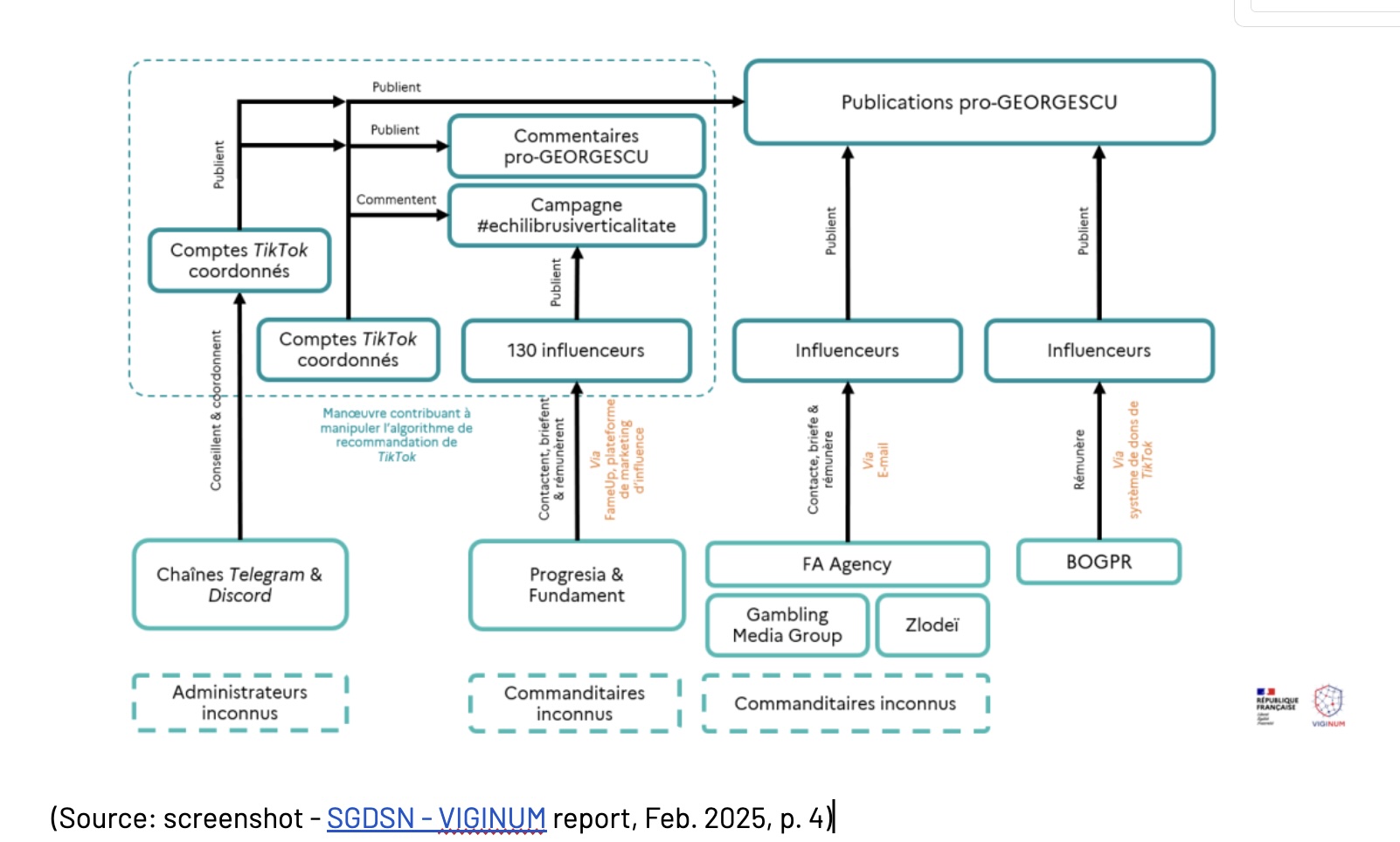
Russian External Intelligence Services reacted pro-Georgescu Călin Georgescu was the only Romanian candidate in the post-Communist Romania, in the case of which the Russian External intelligence service SVR took a public position accusing the European Commission as being behind the "decision of the Romanian prosecutor's office to charge Georgescu” (Izvestia, 2025).
The EU service countering disinformation revealed there was no evidence to support the claims and pointed to the conspiracy theories (EuVsDisinfo, 2025). Călin Georgescu, an outsider in both the political scene and the pre-election polls, declared zero expenses for his electoral campaign, despite trending first in Romanian and ninth worldwide on TikTok, in video trends associated with certain hashtags (CSAT MAI, 2024).
TikTok has 9 million users in Romania and significant influence within the Romanian diaspora, which does not allow political advertising. Georgescu was challenging Romania’s pro-Ukraine stance, advocating for engagement with, rather than confrontation with, Russia (Mihai, 31.01.2025). After the annulment of the Romanian elections, the authorities prosecuted Călin Georgescu with six crimes, including incitement to actions against the constitutional order, in an attempted form - he is accused of having plotted a plan to destabilize Romania.
Due to these accusations, he was under temporary interdiction to leave the country and was banned for a presidential candidacy. "Călin Georgescu discourse, as it appears on social media and on video platforms, was analysed by media and by civic activists to identify pro-Russia, anti-NATO and anti-UE themes, mixed with numerous references to God, with pseudoscience and with a sovereignist approach to agriculture and economy.” (Radu, 2024)
The mechanisms that made Călin Georgescu relevant in the online environment were not entirely unknown; the think tank Expert Forum, had warned prior to the elections on November 24, 2024, about manipulation techniques, particularly the campaign using the hashtag #balanceandverticality on TikTok. However, there was no substantive reaction from the authorities. (Voinea, M.E., Ioniță, S., 18.11.2024)
Călin Georgescu received 2.4 million views in two months, despite having zero funds for his electoral campaign, under the hashtag #balanceandverticality. In addition to the seemingly harmless hashtag like the popular #balanceandverticality, other mechanisms included networks of fake accounts (27,000 of which were identified by TikTok as operating from Turkey) and micro-payments to bloggers with no political affiliation, facilitated by the agency Fade Up. This agency was mentioned in declassified documents from the Romanian intelligence services and later investigated by Le Monde (2024) "Following the model of the Moldovan Stoianoglo campaign, there are Romanian influencers with no political affiliation - i.e., those focused exclusively on fashion, makeup, and entertainment - who helped divert the political campaign of the liberal party. Georgescu's name was not explicitly mentioned. (Expert Forum, 2024). From September 2024 till the end of the year the hasgtag #calingeorgescu has gained 120 million followers. The TikTok was similar to "Brother Near Brother”, the campaign Russia run in Ukraine, based on the manipulation of micro-influencers (the declassified report of the Ministry of Internal Affairs, 2024) and to the one dedicated to Stoianoglo (Cristea, 2024, Expert Forum, 2024).
Apart from its initial warning, Expert Forum investigated the causes and made recommendations for future actions, including:
Data preserved under the retention order issued to TikTok by the European Commission must be made publicly accessible for researchers.
Relying solely on opaque internal investigations conducted by TikTok is not only dysfunctional but also undermines the principles of transparency and accountability, particularly during critical periods such as elections.
Additionally, exploratory research must be conducted to examine TikTok’s recommender system, including practices such as the 'heating system,' where employees manually amplify the virality of content. (Expert Forum, 2025)
Background
TikTok deleted, in April 2025:
2,700 pieces of content violating policies related to civic integrity, disinformation, and AI-generated content.
22-28 April 2025: TikTok identified than 2.3 million fake likes, over 705,000 false follow requests, and blocked more than 4,700 spam accounts in Romania.
over 2,900 fake accounts were deleted, along with more than 323,000 fake likes and 48,000 fake followers. (Source: Radio Free Europe article, Ardelean, 2025)
References
Ardelean, A. (2025, May 4). TikTok claims to have removed two secret networks and thousands of fake accounts attempting to influence Romania's electoral campaign. Radio Free Europe, https://romania.europalibera.org/a/tiktok-a-eliminat-sau-prevenit-activitatea-a-mii-de-conturi/33404383.html
Buruiană, D. (2025, May 6). Simion could escape the entry ban into Moldova as early as the day after the elections. The case is on the judges' table. NewsMaker. https://newsmaker.md/ro/simion-ar-putea-scapa-de-interdictia-de-a-intra-in-moldova-chiar-a-doua-zi-dupa-alegeri-dosarul-pe-masa-judecatorilor
Chan, J. (2022). Online astroturfing: A problem beyond disinformation. Philosophy & Social Criticism, 50(3), 507-528. https://doi.org/10.1177/01914537221108467 (Original work published 2024)
Cristea, A. (2024, October 30). Exclusive: "Stoianoglo operation” on TikTok – Romanian influencers praise the pro-Russian candidate in Moldova. G4Media, https://www.g4media.ro/exclusiv-operatiunea-stoianoglo-pe-tiktok-influenceri-romani-il-lauda-pe-candidatul-pro-rus-din-r-moldova-dupa-acelasi-tipar-influenceri-cu-peste-1-milion-de-urmaritori-alexandr-stoi.html
DiResta, R., & Goldstein, J. A. (2024). How spammers and scammers leverage AI-generated images on Facebook for audience growth. Harvard Kennedy School (HKS) Misinformation Review, 5(4). https://doi.org/10.37016/mr-2020-151
EUvsDisinfo. (n.d.). EU behind Romania’s decision to prosecute candidate Călin Georgescu. https://euvsdisinfo.eu/report/eu-behind-romanias-decision-to-prosecute-candidate-calin-georgescu
Expert Forum. (2024, November). From underdog to contender: The rise of Călin Georgescu in the polls (Policy Brief No. 190). https://expertforum.ro/en/files/2024/11/Policy-Brief-190-From-Underdog-to-Contender-The-Rise-of-Calin-Georgescu-in-the-Polls-4.pdf
Expert Forum. (2025, February). Elections online: The impact of digital platforms during the Romanian electoral campaign. https://expertforum.ro/en/files/2025/02/Elections-online-feb-2025.pdf
Georgescu, A. (2025, May 4). All Romanian websites attacked by hackers are operational, authorities announce: 'May the Force be with you!'. HotNews.ro. https://hotnews.ro/mesajul-care-insoteste-anuntul-autoritatilor-privind-atacurile-cibernetice-ale-site-urilor-din-romania-1963964
Izvestia. (2025, March 4). SVR pointed to EU’s involvement in Georgescu’s accusations – Romanian prosecutor’s office. https://en.iz.ru/en/1848607/2025-03-04/svr-pointed-eus-involvement-georgescus-accusations-romanian-prosecutors-office
Martinescu, A.-L., Stallard, S., Balatchi-Lupascu, A., Forlafu, M.G. & the Osavul Data Team: Kurtov, Y. Bilash, D., Plieshakov, D. &Popov, Y. (2024, December), Networks of Influence: Decoding foreign meddling in Romania’s elections A collaborative investigation into disinformation campaigns and influence operations, https://fpc.org.uk/wp-content/uploads/2024/12/Networks-of-Influence-Decoding-foreign-meddling-in-Romanias-elections-2024.pdf
Meta. (n.d.). Coordinated inauthentic behaviour. https://about.fb.com/news/tag/coordinated-inauthentic-behavior
Mihai, I. (2025). Romania’s former pro-Russian candidate under fire over Ukrainian land claims call. Euractiv. https://www.euractiv.com/section/politics/news/romanias-former-pro-russian-candidate-under-fire-over-ukrainian-land-claims-call/
Ministry of Internal Affairs. Document: CSAT-MAI report on online political manipulation during the 2024 campaign [PDF]. https://tinyurl.com/2s3t4h32
Neag, M., Tolontan, C., Roșu, I., & Luțac, R. (2024, December 20). ANAF a descoperit că PNL a plătit o campanie care l-a promovat masiv pe Călin Georgescu pe TikTok. Snoop. https://tinyurl.com/snoop-anaf-findings
News.ro. (2025, May 1). Anatol Șalaru a câștigat procesul ce i-l intentase George Simion în Republica Moldova, în urma unor declarații făcute acum trei ani: „A fost declarat persona non grata. Simion rămâne același trădător cu care ați bătut palma”. https://www.news.ro/politic-intern/anatol-salaru-castigat-procesul-mi-l-intentat-george-simion-republica-moldova-urma-trei-ani-spus-declarat-persona-non-grata-simion-ramane-acelasi-tradator-ati-batut-palma-1922401510512025041021998236
Pândaru, C. (2025, May 7), [video-interviu with George Simion], Digi24, https://www.digi24.ro/video/george-simion-spune-ca-il-va-nominaliza-premier-pe-calin-georgescu-3230079
Pop, R. (2025, February 20). How many Romanians are in diaspora - a detailed analysis of Romania's population abroad. Știri pe surse. https://www.stiripesurse.ro/cati-romani-sunt-in-diaspora-o-analiza-detaliata-a-populatiei-romaniei-in-strainatate_3589131.html
Radu, R., (2024, 17 December). Romania: How a Disinformation campaign prevented the free suffrage. Disinfo-Prompt. https://disinfo-prompt.eu/posts/6gVQHsgN02LeYCnVzI6wGx
Reynaud, F., Leloup, D. (2024).Romania: Pro-Georgescu videos linked to mysterious Polish influencer agency. Le Monde. (2024, December 7). https://www.lemonde.fr/en/pixels/article/2024/12/07/romania-pro-georgescu-videos-linked-to-mysterious-polish-influencer-agency_6735478_13.html
Presidential Administration, (2025, May 6). Comunicat de presă [Press release]. https://www.presidency.ro/ro/media/comunicate-de-presa/comunicat-de-presa1733327193
SGDSN – VIGINUM. (2025, February 4). Risks to French interests in the Romanian elections – Public report. https://www.sgdsn.gouv.fr/files/files/Publications/20250204_NP_SGDSN_VIGINUM_Rapport_public_Elections_roumanie_risques_france_VFF.pdf
Terheș, C. V. [@CristianVTerhes]. (2025). [Facebook post]. Facebook. https://www.facebook.com/CristianVTerhes/posts/1262185605913051
TikTok Newsroom. (2024, December 6; updated 2025, January 7). Continuing to protect the integrity of TikTok during Romanian elections. https://newsroom.tiktok.com/en-eu/continuing-to-protect-the-integrity-of-tiktok-during-romanian-elections
Turnul Sfatului. (2025, May 5). Updated. George Simion landed in Sibiu from Vienna, the day after the first round of elections. He took pictures with "famous European politicians". https://www.turnulsfatului.ro/2025/05/05/actualizare-george-simion-a-aterizat-la-sibiu-de-la-viena-a-doua-zi-dupa-turul-intai-al-alegerilor-a-facut-poze-cu-rdquo-politicieni-europeni-de-renume-bdquo-219584
Voinea, M.E., Ioniță, S. (2024, 18 November), Policy Brief 190From Underdog to Contender: The Rise of Călin Georgescu in the Polls. Politics on Romanian TikTok. Monitored interval: January-November 2024, https://expertforum.ro/en/files/2024/11/Policy-Brief-190-From-Underdog-to-Contender-The-Rise-of-Calin-Georgescu-in-the-Polls-4.pdf
Ziarul de Gardă. (2025, April 10). DOC/ Former Defense Minister Anatol Salaru announces that he has won his lawsuit against George Simion. "The lawyer did a trick, he didn't register him by his surname, not to attract attention" https://www.zdg.md/stiri/doc-fostul-ministru-al-apararii-anatol-salaru-anunta-ca-a-castigat-procesul-de-judecata-cu-george-simion-avocatul-a-facut-o-smecherie-nu-l-a-inregistrat-dupa-numele-de-familie-sa-nu-atra/